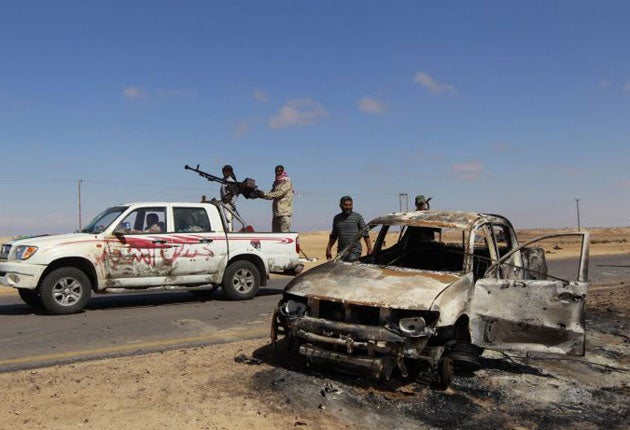Libyan rebels reject African Union peace plan

Libyan rebels swiftly rejected an African Union peace initiative today, saying there could be no deal to end a two-month-old civil war unless Muammar Gaddafi left power.
The initiative collapsed hours after South African President Jacob Zuma, head of an African Union mission, said Gaddafi had accepted the plan, including a ceasefire proposal.
As African presidents negotiated with the rebel leadership in their stronghold of Benghazi, residents said Gaddafi's forces bombarded the besieged western city of Misrata where residents reported heavy fighting.
Western leaders also rejected any deal that did not include Gaddafi's removal and Nato refused to suspend its bombing of his forces unless there was a credible ceasefire.
Nato Secretary-General Anders Fogh Rasmussen told a Brussels news briefing that Gaddafi's government had announced ceasefires in the past, but "they did not keep their promises".
Rebel leader Mustafa Abdel Jalil told a news conference after the talks in Benghazi: "The African Union initiative does not include the departure of Gaddafi and his sons from the Libyan political scene, therefore it is outdated."
Nato said its air strikes against government armour, which have recently increased, would continue as long as Gaddafi targeted civilians.
A resident of the coastal city of Misrata, which has been under siege for six weeks, told Reuters heavy fighting was under way on the eastern approaches and in the centre.
Rebels told Reuters Gaddafi's forces fired Russian-made Grad rockets into the city, where conditions for civilians are said to be desperate.
Earlier Al Jazeera television quoted a rebel spokesman as saying five people died and 20 were wounded in Misrata, a lone rebel bastion in western Libya.
Zuma did not travel from Tripoli to Benghazi with other AU delegates, to the rebels' surprise, but issued a statement when he got home saying the mission was "a huge success".
Libyan officials have repeatedly said that Gaddafi, who holds no official state position, will not quit.
The AU delegation was met in Benghazi by up to 3,000 demonstrators holding banners reading: "African Union take Gaddafi with you" and "Gaddafi has committed genocide".
They pushed up to the doors of the hotel where the talks were held, yelling "the people want the downfall of the regime".
Officials from Nato, which is bombing Libyan government armour under a United Nations mandate to protect civilians, said they took note of the African Union plan but the alliance would continue operations while civilians were at risk.
Human Rights Watch accused Gaddafi's forces of indiscriminate attacks on civilians in Misrata which violated international law. It said about 250 people had died.
The African Union does not have a good track record in brokering peace deals, having failed recently to end conflicts or disputes in Somalia, Madagascar and Ivory Coast.
At the front outside the eastern rebel-held town of Ajdabiyah, rebels buried the charred bodies of Gaddafi troops killed in air strikes and said they were advancing westwards.
But there were only light skirmishes on Monday on the contested road to the oil port of Brega, 45 miles further west, in contrast to yesterday's heavy fighting in Ajdabiyah when rebels repelled a government assault.
Nato stepped up attacks on Gaddafi's armour over the weekend, destroying 25 tanks around Misrata and Ajdabiyah after rebels accused them of acting too slowly.
An AU statement after the Tripoli talks spoke of a transition but made no mention of Gaddafi's future. Asked if the issue of him stepping aside was discussed, Ramtane Lamamra, AU Commissioner for Peace and Security, told reporters: "There was some discussion."
However he added: "I cannot report on confidential discussions because first of all I was not part of them."
The AU proposal included an immediate cessation of hostilities, effective monitoring of the ceasefire, the delivery of humanitarian aid and the protection of foreigners.
In Washington, Secretary of State Hillary Clinton said the United States wanted to see "the departure of Gaddafi from power and from Libya", but avoided comment on the AU plan.
The rebels had previously rejected a negotiated outcome to what has become the bloodiest in a series of pro-democracy revolts across the Arab world that have ousted the autocratic leaders of Tunisia and Egypt.
The Nato attacks outside Ajdabiyah on Sunday helped break the biggest assault by Gaddafi's forces on the eastern front for at least a week. The town is the gateway to the rebel stronghold of Benghazi 90 miles north up the Mediterranean coast.
Today upbeat rebels were putting burned and mangled bodies into blankets by blackened government vehicles outside Ajdabiyah and dragging them into the desert for burial.
"We have been able to advance because of the air strikes," said rebel Belgassim El-Awami. It was not clear how far west the rebels had moved along a front which has swung back and forth for more than a week in a fight for the oil port of Brega.
Opposition fighters have been overwhelmed by Gaddafi's firepower in western Libya, close to his base of Tripoli, but are increasingly using guerrilla tactics to weaken his hold.
Tripoli residents said there had been several attacks on army checkpoints and a police station in the last week and gunfire can be heard at night.
Join our commenting forum
Join thought-provoking conversations, follow other Independent readers and see their replies
Comments
Bookmark popover
Removed from bookmarks